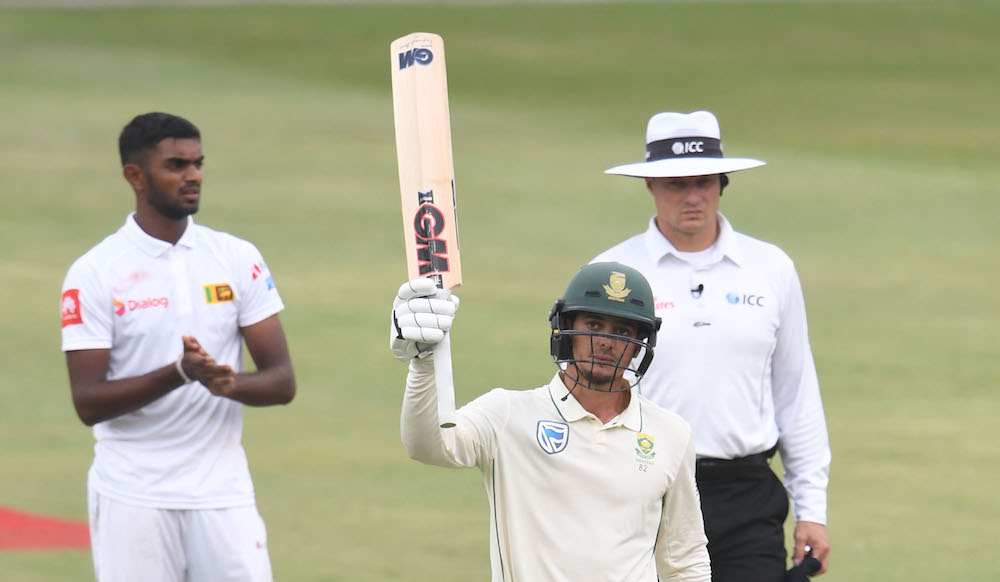Quinton de Kock needs to take more responsibility in the Proteas batting lineup in the Test series against India following the retirement of stalwart Hashim Amla, writes JOHN GOLIATH.
De Kock was probably the obvious choice as T20 captain in the absence of Faf du Plessis for the recent series against India. But it’s a decision that could benefit South African cricket in more ways than one over the next couple of years.
He made two half-centuries in the last two matches of the series after the first T20 was rained out. The unbeaten 79 in the third match was one of the best innings I’ve seen the Proteas wicketkeeper play in a very long time.
The knock, which helped the Proteas share the spoils in the series 1-1, had the normal flair with four boundaries and five sixes. It also came off just 52 balls on a pitch where the India’s superstar batsmen struggled to get going.
But what was impressive is the way he went about his knock and taking the responsibility on himself to lead the side to victory.
It was a captain’s knock if ever I saw one.
This is in stark contrast to some of the innings the dashing left-hander played at the 2019 World Cup in England, where he got starts, but ended up getting out with a loose shot when his team needed him to bat for a long time. In the opening match against England, the Proteas were 44-2 in the 10th over after losing the wickets of Aiden Markrkam and Du Plessis, while Amla went off the field for treatment after a blow to the helmet.
De Kock and Rassie van der Dussen got the team back on track to try to chase down England’s 311. But De Kock, with the game in the balance, hit the ball straight down backward square leg’s throat with the score on 129. The Proteas were eventually bowled out for 207.
De Kock also played a rash shot in the match against India, while his slog sweep in the must-win game against Pakistan during a sensitive time in the match also led to his downfall.
If the wicketkeeper-batsman had converted that 68 against England and the 47 against Pakistan into centuries, the Proteas could have actually made the playoffs. But he couldn’t rein himself, and his natural instincts, in during those knocks and paid the price.
The normal argument is that’s the way De Kock plays. It’s his natural game. ‘Leave him and let the boy play his game.’ But the best players in the world know when to actually change gears and play the situation.
India’s Rohit Sharma is one of the most destructive ODI openers on the planet, but had to change up his game at times to be a bit more circumspect. The same applied to Australian David Warner, who also sacrificed strike rate at certain times to help their teams to victory.
Sharma scored five centuries during the World Cup to help India to the semi-finals. Warner scored three. De Kock hasn’t managed a single 100 in 17 World Cup matches over two tournaments. That’s perspective.
De Kock remains one of the best players in the world and should strive to be more than just a player who ‘sees ball, hit ball’. He should strive to get 200 in an ODI. He should strive to get big runs in Test cricket, and not just come in at No 7 and hit out while protecting the tail.
Still just 26, the baby-faced blaster has been playing international cricket for almost seven years but he is not a kid anymore and it’s time he showed a lot more maturity in the way he goes about his batting.
The Proteas are entering a new era and a Test series against India without Amla and, possibly sooner rather than later, without Du Plessis. They need De Kock needs to step up and take more responsibility as one of the best batsmen in the world and become the team’s talisman with the bat.
India is a difficult place to tour and a player such as De Kock needs to play a big role with the bat, just like he did in the T20 series, where he took on the responsibility of captaining the team like a champ.
Now, he needs to take on that responsibility as senior player in the Test side.
Photo: Gallo Images







